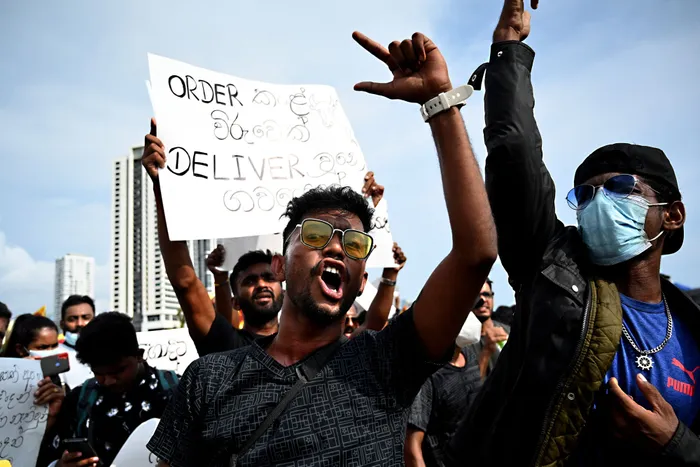Rights Group Calls for Rajapaksa’s Hide as Sri Lanka Swears in New Cabinet

Picture: Ishara S Kodikara/AFP – Protesters demonstrate against the economic crisis in Colombo on April 12, 2022. Following former president Gotabaya Rajapaksa’s departure, the prime minister, Ranil Wickremesinghe, was sworn in as the new president of Sri Lanka on Friday in with the hopes of rebuilding the nation, the writer says.
By Shifaan Ryklief
Following the chaos that erupted in Sri Lanka over the past two weeks when angry protesters stormed the president’s home and demanded he step down, new leadership has now been sworn in with the hopes of rebuilding the nation.
Former president Gotabaya Rajapaksa, who has been accused of being responsible for Sri Lanka’s worst economic crisis in decades, fled the country with his family as the situation worsened.
Rajapaksa fled to neighbouring Maldives in a military aircraft and later travelled to Singapore from where he sent his official resignation.
Similarly to South Africa, Sri Lanka’s 22 million people have also been hit with rolling power outages, fuel and food increases, as well as record inflation.
Following Rajapaksa’s departure, the prime minister, Ranil Wickremesinghe, was left in charge to hold things together and ultimately sworn in as the new president of Sri Lanka on Friday along with 18 cabinet ministers. Minister of public administration Dinesh Gunawardena, who also previously served as the foreign minister and education minister, was sworn in as the new prime minister.
Meanwhile, Sri Lanka’s besieged presidential office reopened on Monday after security forces with batons cleared the area.
According to the BBC, the troops also raided the main anti-government protest camp in the capital on Friday, arresting at least nine people and dismantling tents.
Furthermore, a South African-based rights group has submitted a criminal complaint to Singapore’s attorney general, demanding the arrest of the former president Rajapaksa for alleged war crimes and his role in the nation’s decades-long civil war.
Lawyers from the International Truth and Justice Project (ITJP) filed a 63-page complaint on Saturday that argues that Rajapaksa committed grave breaches of the Geneva Conventions during the civil war in 2009.
The complaint also noted that Rajapaksa committed violations of international humanitarian law and international criminal law during the civil war in Sri Lanka.
“These include murder, execution, torture and inhuman treatment, rape and other forms of sexual violence, deprivation of liberty, severe bodily and mental harm, and starvation,” ITJP said in a statement.
“The economic meltdown has seen the government collapse but the crisis in Sri Lanka is really linked to structural impunity for serious international crimes going back three decades or more,” the ITJP's executive director, Yasmin Sooka, said.
Ryklief is a multimedia journalist at African News Agency (ANA)
* This article is original to the The African. To republish, see terms and conditions.